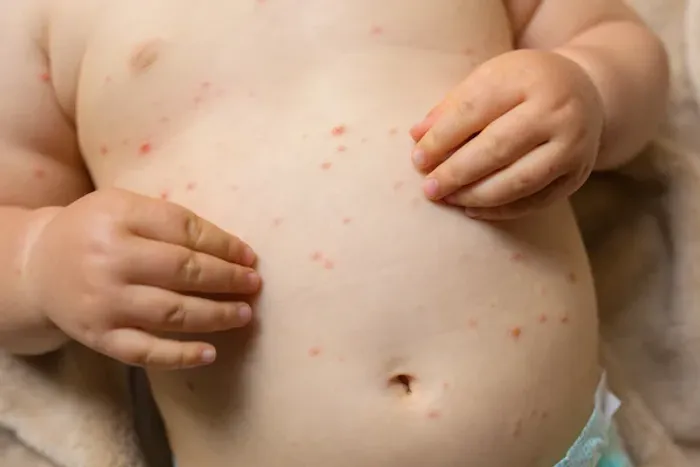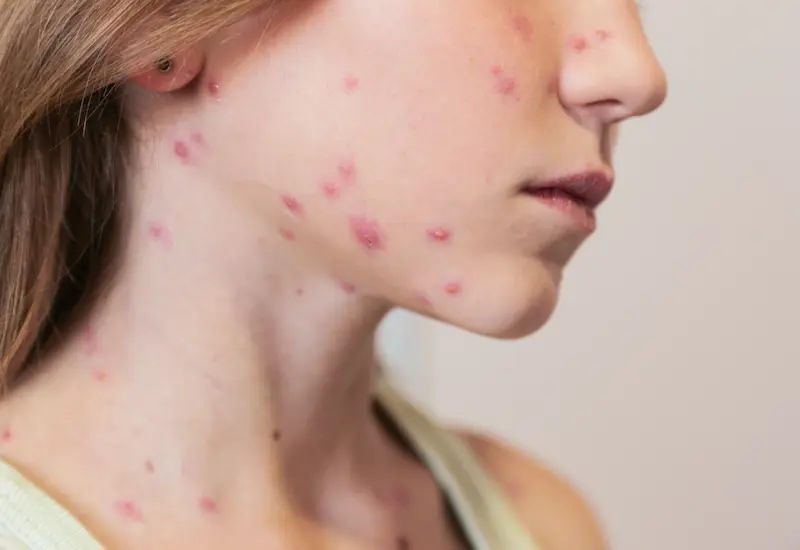Chickenpox: Recognising the Signs and Effective Prevention Strategies
Learn how to recognise the early signs of chickenpox, understand how it spreads, and explore the most effective prevention and treatment strategies, including vaccination.

Written by Dr. Dhankecha Mayank Dineshbhai
Reviewed by Dr. Mohammed Kamran MBBS, FIDM
Last updated on 13th Jan, 2026

Introduction
Chickenpox, once a common childhood rite of passage, is an infection caused by the varicella-zoster virus. Known for its signature itchy, blister-like rash, it spreads with ease and can be more serious than many people realise. While often mild in healthy children, it can lead to severe complications in infants, adults, pregnant women, and those with weakened immune systems. The good news is that today, we have powerful tools to prevent it altogether. This comprehensive guide will walk you through everything you need to know—from spotting the very first signs of chickenpox to understanding the most effective preventions. Whether you're a concerned parent or an adult who never had it, knowing these facts is your first line of defence.
What is Chickenpox? Understanding the Virus Behind the Itch
Chickenpox is a highly contagious disease caused by the varicella-zoster virus (VZV). Before the vaccine became widely available, it was incredibly common, with most people experiencing it before adulthood. The infection typically runs its course in about a week to ten days, but the virus itself never truly leaves the body.
The Varicella-Zoster Virus (VZV): A Closer Look
After a person recovers from chickenpox, the virus remains dormant (inactive) in nerve tissues. Years or even decades later, VZV can reactivate and cause a different illness known as shingles (herpes zoster). This is why understanding and preventing the initial chickenpox infection is crucial not only for acute illness but also for long-term health. The Centers for Disease Control and Prevention (CDC) states that two doses of the chickenpox vaccine are about 90% effective at preventing the disease.
Health topic carousel:
Doctor's speciality: General Practitioner
Text: Consult a Specialist for the best advice
The Tell-Tale Signs: Early Symptoms and the Rash Progression
Recognising chickenpox early is key to managing symptoms and preventing its spread to others. The illness typically unfolds in distinct stages.
Stage 1: The Prodromal Phase (Before the Rash)
Before the famous rash appears, an individual may experience flu-like symptoms for a day or two. These early signs of chickenpox can include:
Fever (usually 101°F to 102°F)
Loss of appetite
Headache
Tiredness and a general feeling of being unwell (malaise)
These initial symptoms are common to many illnesses, which is why chickenpox can be contagious before it's officially diagnosed.
Stage 2: The Unmistakable Chickenpox Rash
The classic rash usually appears 1 to 2 days after the initial symptoms. It goes through three phases, often simultaneously on the same body. A key characteristic is that new waves of bumps can appear for several days, meaning you may see bumps, blisters, and scabs all at once.
Phase 1: Red Bumps and Papules
The rash begins as small, red bumps that can look like pimples or insect bites. They often first appear on the face, chest, and back before spreading to the rest of the body, even inside the mouth, eyelids, or genital area.
Phase 2: Fluid-Filled Blisters (Vesicles)
Within about a day, the red bumps quickly fill with a clear fluid, becoming blisters (vesicles). These blisters are extremely itchy and fragile.
Phase 3: Cloudy Blisters and Crusting Over
After another day or so, the clear fluid in the blisters turns cloudy, the blisters break open, and they begin to crust over, forming dry, brown scabs. The scabs take several days to fall off naturally.
How Long Do Chickenpox Symptoms Last?
From the onset of fever to the point where all blisters have scabbed over, the illness typically lasts about 5 to 10 days. The person remains contagious until all the blisters have crusted over.
How Does Chickenpox Spread? Knowing the Contagious Period
Chickenpox is one of the most contagious diseases. Understanding its transmission is fundamental to preventing chickenpox in your household and community.
Direct Contact and Airborne Transmission
The virus spreads through:
Airborne Respiratory Droplets: Inhaling tiny particles from an infected person's coughs or sneezes.
Direct Contact with the Rash: Touching the fluid from the chickenpox blisters.
From Exposure to Infection: The Incubation Period
After being exposed to the virus, it takes about 10 to 21 days (average 14-16 days) for symptoms to develop. Crucially, an infected person can spread the virus from 1 to 2 days before the rash appears until all blisters have formed scabs.
Who is Most at Risk for Severe Chickenpox?
While anyone who hasn't had chickenpox or been vaccinated can get it, certain groups are at higher risk for serious complications like bacterial skin infections, pneumonia, or encephalitis (brain inflammation). High-risk groups include:
Newborns and infants
Adults
Pregnant women (which can also lead to birth defects)
People with weakened immune systems (e.g., from HIV/AIDS, cancer treatment, or organ transplants)
The Gold Standard of Prevention: The Chickenpox Vaccine
The most effective way to prevent chickenpox is through vaccination. The varicella vaccine has dramatically reduced the number of cases and related hospitalisations since its introduction.
How the Varicella Vaccine Works
The vaccine contains a weakened form of the live virus. It stimulates your immune system to produce antibodies that will protect you if you are exposed to the wild virus in the future.
Vaccine Schedule and Effectiveness
The CDC recommends two doses of the chickenpox vaccine:
First dose: Between 12 and 15 months of age.
Second dose: Between 4 and 6 years of age.
For older children, adolescents, and adults who have never had chickenpox or been vaccinated, two doses are given 4 to 8 weeks apart. The vaccine is very effective, preventing almost all cases of severe disease.
Common Questions About the Chickenpox Vaccine
Can you get chickenpox from the vaccine? It is very rare, but a mild rash with a few bumps can occur. This is not a cause for alarm and indicates the immune system is responding.
What are the side effects? They are typically mild, such as soreness at the injection site, a mild fever, or a temporary rash.
Additional Prevention Strategies for High-Risk Groups
For those who cannot be vaccinated (e.g., due to allergies or severe immunocompromise) or who have been exposed, other prevention methods include:
Varicella-Zoster Immune Globulin (VarIZIG): This is a blood product containing antibodies against the virus. It can be given to high-risk individuals within 10 days of exposure to reduce the severity of the infection.
Avoiding Contact: Strictly avoiding anyone who is infected or may be infected is crucial.
If You Get Chickenpox: Managing Symptoms and Preventing Spread
If you or your child contracts chickenpox, the goal is to alleviate symptoms and prevent secondary infections and scarring.
Soothing the Itch and Discomfort at Home
Here are some simple, effective ways to ease itching and discomfort:
Oatmeal Baths: Soaking in cool or lukewarm water with colloidal oatmeal can relieve itching.
Calamine Lotion: Applying this lotion to the spots can help dry them out and soothe the itch.
Antihistamines: Medications like diphenhydramine (Benadryl) can reduce itching, especially at night. Always consult a doctor for the correct dosage, especially for children.
Keep Nails Short: This is vital to prevent chickenpox scarring from scratching, which can also lead to bacterial skin infections.
Stay Hydrated and Rest: Drink plenty of fluids and get lots of rest to help the body fight the virus.
When to Seek Medical Attention
While most cases can be managed at home, you should consult a doctor if:
The fever lasts more than 4 days or goes away and then returns.
The rash becomes very red, warm, or tender (signs of a bacterial infection).
The rash spreads to the eyes.
The person shows signs of dehydration or has a stiff neck, confusion, or trouble walking.
If symptoms are severe or you are in a high-risk group, consult a doctor online with Apollo24|7 for further evaluation. They may prescribe antiviral medications like acyclovir, which can lessen the severity if started early.
Conclusion
Chickenpox may seem like a simple childhood illness, but its potential for discomfort and serious complications makes prevention paramount. By recognising the signs of chickenpox early—from the initial fever to the distinct blistering rash—you can take swift action to care for your loved one and prevent the virus from spreading. However, the single most powerful tool we have is prevention through vaccination. The varicella vaccine is a safe and proven way to protect yourself, your children, and the more vulnerable members of our community from this contagious disease. If your condition does not improve after trying home management methods, or if you have concerns about symptoms, book a physical visit to a doctor with Apollo24|7 for personalised care and peace of mind.
Health topic carousel:
Doctor's speciality: General Practitioner
Text: Consult a Specialist for the best advice
Consult Top Specialists for Personalised Tips

Dr. Rajib Ghose
General Physician/ Internal Medicine Specialist
25 Years • MBBS
East Midnapore
VIVEKANANDA SEBA SADAN, East Midnapore

Dr. Ashita Kuruvilla
General Practitioner
7 Years • MBBS
Kolkata
KVC CLINIC, Kolkata
Dr. Srilekhya
Internal Medicine Specialist Diabetologist
10 Years • MBBS, MD (GENERAL MEDICINE)
Bengaluru
Apollo Medical Center, Marathahalli, Bengaluru

Dr. Shiv Krishna Mitra
General Practitioner
15 Years • MBBS GEN. MED. PGDRM, MCH
Kolkata
Samaritan Clinic, Kolkata

Dr. Debdatta Pati
Psychiatrist
18 Years • MBBS, DPM, MD (PSYCHIATRY)
Kolkata
MCR SUPER SPECIALITY POLY CLINIC & PATHOLOGY, Kolkata
Consult Top Specialists

Dr. Rajib Ghose
General Physician/ Internal Medicine Specialist
25 Years • MBBS
East Midnapore
VIVEKANANDA SEBA SADAN, East Midnapore

Dr. Ashita Kuruvilla
General Practitioner
7 Years • MBBS
Kolkata
KVC CLINIC, Kolkata
Dr. Srilekhya
Internal Medicine Specialist Diabetologist
10 Years • MBBS, MD (GENERAL MEDICINE)
Bengaluru
Apollo Medical Center, Marathahalli, Bengaluru

Dr. Shiv Krishna Mitra
General Practitioner
15 Years • MBBS GEN. MED. PGDRM, MCH
Kolkata
Samaritan Clinic, Kolkata

Dr. Debdatta Pati
Psychiatrist
18 Years • MBBS, DPM, MD (PSYCHIATRY)
Kolkata
MCR SUPER SPECIALITY POLY CLINIC & PATHOLOGY, Kolkata
More articles from Chickenpox
Frequently Asked Questions
Can you get chickenpox twice?
It is very rare. After having chickenpox, most people develop lifelong immunity. However, the virus can reactivate later in life as shingles, which is a different condition.
What is the difference between chickenpox and shingles?
Both are caused by the same virus (VZV). Chickenpox is the initial infection. Shingles is a painful skin rash that occurs when the dormant virus reactivates in the nerve tissues.
How can I prevent chickenpox scarring?
The best way is to avoid scratching. Keep nails short, use anti-itch treatments like calamine lotion or oatmeal baths, and consider wearing mittens at night for young children. If a spot looks infected (very red, pus-filled), see a doctor.
Is chickenpox dangerous for pregnant women?
Yes, it can be. It can cause serious complications for the pregnant person and lead to birth defects in the newborn (congenital varicella syndrome). Pregnant women who have not had chickenpox or the vaccine should avoid exposure and consult their doctor immediately if exposed.
What should I do if my newborn is exposed to chickenpox?
Contact your pediatrician immediately. Newborns have immature immune systems and are at high risk for severe complications. The doctor may recommend VarIZIG to help protect them.

